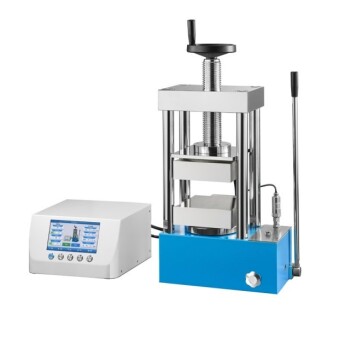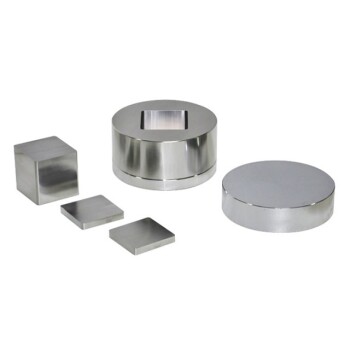At its core, a hydraulic press is a master of force. It is suitable for any application that requires the controlled application of immense pressure, primarily for forming, molding, assembling, and crushing materials. Its versatility spans industries from heavy manufacturing and automotive to delicate laboratory sample preparation and even food production.
The defining strength of a hydraulic press is not speed, but its ability to generate and sustain enormous, uniform force throughout its entire stroke. This makes it the superior choice for tasks involving deep material deformation, complex shaping, and high-pressure compaction.

The Principle: Why Hydraulic Power Excels
To understand the applications, you must first understand the fundamental advantage of hydraulic power. The machine's design is a direct application of Pascal's Law.
Pascal's Law: Force Multiplication
A hydraulic press uses an incompressible fluid (typically oil) to transmit force. A small force applied to a small piston generates a much larger force on a larger piston, effectively multiplying the input force.
This principle allows a relatively small motor and pump to generate tonnage far beyond what a mechanical system of the same size could achieve.
Unmatched Force Generation
Hydraulic presses are defined by the massive, consistent force they can deliver. This makes them indispensable for working with thick, high-strength materials that require tons of pressure to shape, such as in forging metal billets or forming automotive body panels.
Precision and Control Over the Full Stroke
Unlike a mechanical press that delivers maximum force only at the bottom of its stroke, a hydraulic press can apply full, controlled pressure at any point. This gives the operator precise control over speed, pressure, and position, which is critical for complex operations like deep drawing and intricate molding.
Core Industrial Applications
The unique capabilities of a hydraulic press lead to its widespread use across numerous industrial processes.
Metal Forming and Shaping
This is the most common category of use. The sustained, powerful pressure is perfect for deforming metal into desired shapes without fracturing it.
Key operations include:
- Forging: Shaping hot metal billets into strong components like turbine blades.
- Deep Drawing: Forming flat metal sheets into deep-cup shapes, like a kitchen sink.
- Stamping & Bending: Creating car body panels or bending thick structural steel beams.
- Clinching & Punching: Joining or perforating metal sheets with controlled force.
Compression Molding and Compacting
A hydraulic press is ideal for compressing materials into a solid, dense form. This applies to everything from industrial materials to food products.
Common uses are:
- Plastics & Rubber: Molding thermoset plastics and rubber into finished parts.
- Powder Compacting: Forming powdered metals or ceramics into solid shapes before sintering.
- Specialty Applications: Creating fat-free cocoa powder by pressing the fat out of cocoa beans.
Assembly and Joining
The controlled application of force is essential for assembling components with a tight, interference fit.
Examples include:
- Press-Fitting: Installing bearings, shafts, and bushings into housings.
- Riveting & Crimping: Forming permanent mechanical joints in assemblies.
Material Testing and Laboratory Use
In a laboratory setting, the press's precision is paramount for preparing samples and testing material properties.
This includes:
- Sample Preparation: Creating KBr pellets for spectroscopic analysis.
- Strength Testing: Performing tension and compression tests on materials like concrete.
Shearing, Straightening, and Destruction
The raw power of a hydraulic press is also used for cutting and processing materials, especially for recycling. A high-tonnage press can easily shear through thick metal or crush large objects.
The most visible example is scrap baling, where entire cars are crushed into compact cubes for recycling.
Understanding the Trade-offs
While incredibly versatile, a hydraulic press is not the solution for every problem. Its primary limitation is speed.
Speed vs. Force
Hydraulic presses are generally slower than their mechanical counterparts. For high-speed, high-volume production of simple, shallow parts (like small stamped brackets), a mechanical press is often more efficient.
System Complexity and Maintenance
A hydraulic system involves fluid, pumps, hoses, valves, and seals. This introduces a need for diligent maintenance to prevent leaks and ensure consistent performance, which can be more complex than maintaining a mechanical press.
Initial Cost and Footprint
Due to their robust construction and hydraulic components, these machines are often large, heavy, and represent a significant capital investment. The foundation required to support a high-tonnage press is also a major consideration.
Making the Right Choice for Your Goal
Selecting the right machine depends entirely on the demands of your specific task.
- If your primary focus is massive force and precision control: A hydraulic press is the ideal choice for deep drawing, forging, complex molding, and high-tonnage forming.
- If your primary focus is high-speed, repetitive stamping: A mechanical press is likely the more cost-effective and efficient solution for high-volume production of simple parts.
- If your primary focus is laboratory testing or prototyping: A smaller benchtop hydraulic press offers the necessary control and force for sample preparation and material analysis.
Ultimately, choosing a hydraulic press is a decision to prioritize power and control above all else.
Summary Table:
| Application Category | Key Uses |
|---|---|
| Metal Forming | Forging, deep drawing, stamping, bending |
| Compression Molding | Plastics, rubber, powder compacting |
| Assembly | Press-fitting, riveting, crimping |
| Laboratory | Sample preparation, material testing |
| Shearing & Destruction | Scrap baling, straightening |
Ready to enhance your operations with reliable hydraulic presses? KINTEK specializes in lab press machines, including automatic lab presses, isostatic presses, and heated lab presses, designed to meet the precise needs of laboratories. Our equipment ensures superior force control and efficiency for tasks like sample preparation and material testing. Contact us today to discuss how our solutions can benefit your lab and streamline your processes!
Visual Guide

Related Products
- Automatic Laboratory Hydraulic Press Lab Pellet Press Machine
- Manual Laboratory Hydraulic Press Lab Pellet Press
- 24T 30T 60T Heated Hydraulic Lab Press Machine with Hot Plates for Laboratory
- Automatic Laboratory Hydraulic Press for XRF and KBR Pellet Pressing
- Laboratory Hydraulic Press 2T Lab Pellet Press for KBR FTIR
People Also Ask
- How are hydraulic pellet presses used in educational and industrial settings? Boost Efficiency in Labs and Workshops
- What are the advantages of using a hydraulic press for pellet production? Achieve Consistent, High-Quality Samples
- How do hydraulic pellet presses contribute to material testing and research? Unlock Precision in Sample Prep and Simulation
- What are the limitations of hand-operated presses? Avoid Sample Compromise in Your Lab
- How are hydraulic presses used in the preparation of powder mixtures? Achieve Precise Compaction for Accurate Analysis



















